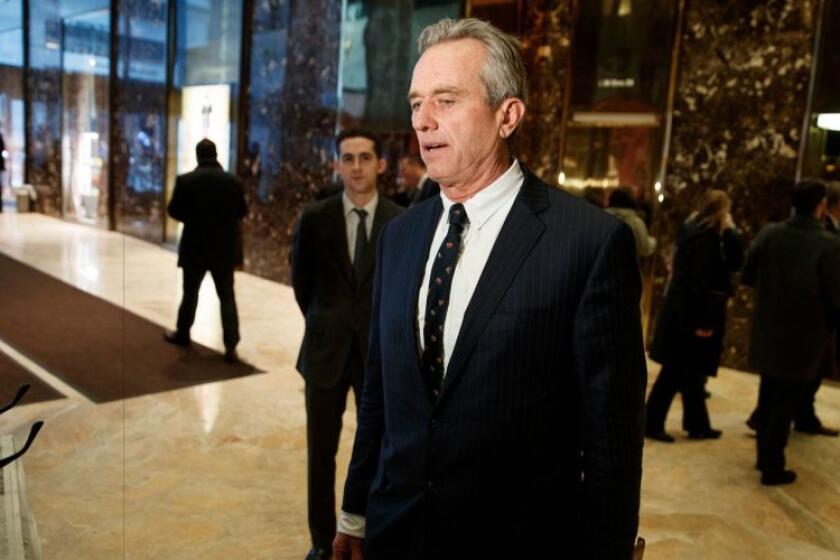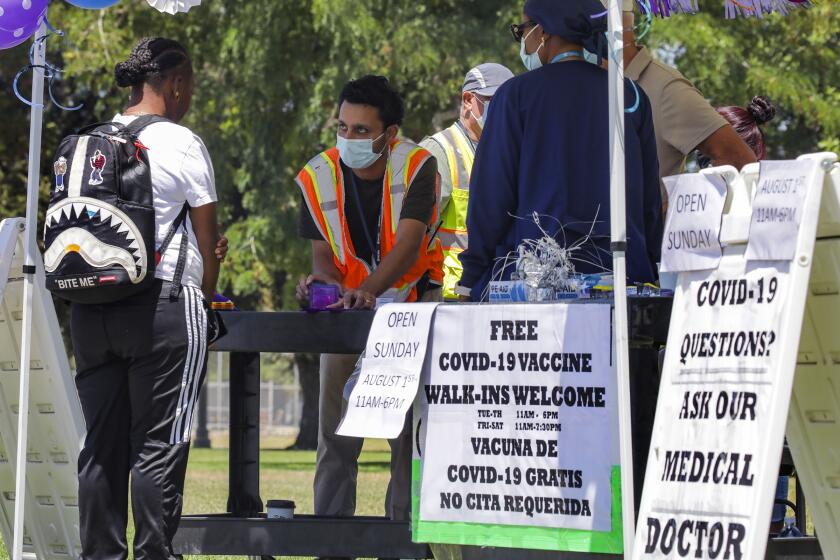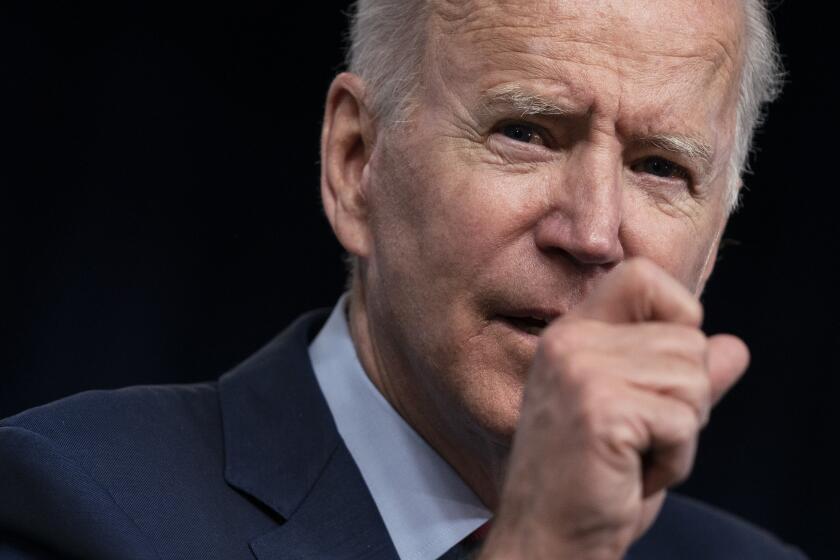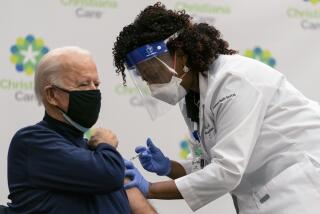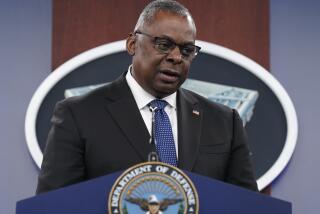Column: Here’s why Biden’s vaccine mandate is right — and should stand up to legal challenges
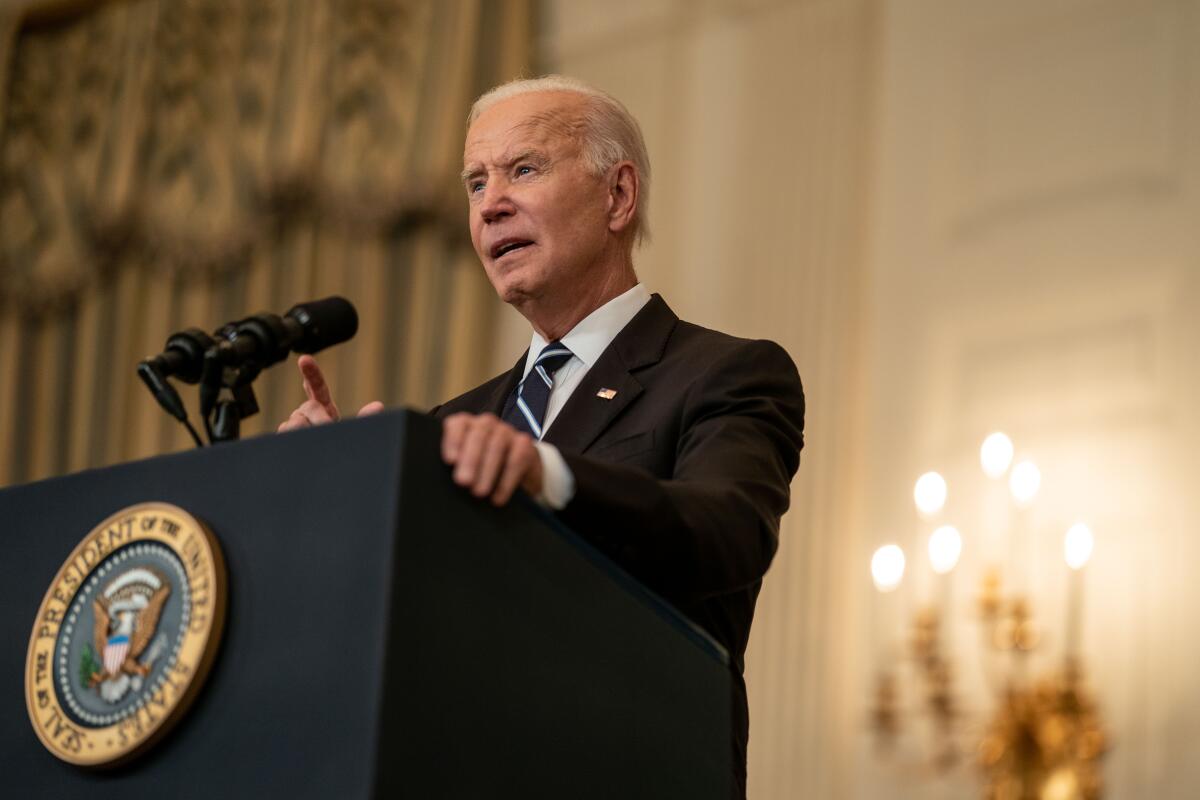
- Share via
Displaying the same frustration and anger that millions of Americans feel about people placing themselves, their loved ones and their communities at risk by refusing vaccinations for COVID-19, President Biden on Thursday brought the hammer down.
In a wide-ranging series of orders, Biden said his administration will mandate that all employers with more than 100 workers require vaccines or stringent testing for all employees. He’s imposing even stricter requirements for federal workers, federal contractors, educational programs and healthcare organizations that receive federal funding.
Roughly 100 million Americans may be covered by the new rules.
A community has the right to protect itself against an epidemic of disease which threatens the safety of its members.
— Supreme Court Justice John Marshall Harlan in 1905
As we’ve been writing, mandates are the most effective way to bring under the vaccination umbrella the millions of eligible Americans who have been holding out. That’s especially true of those who do so on partisan or ideological grounds.
As Biden said in introducing his program Thursday, COVID vaccination “is not about freedom or personal choice. it’s about protecting yourself and those around you — the people you work with, the people you care about, the people you love.”
Get the latest from Michael Hiltzik
Commentary on economics and more from a Pulitzer Prize winner.
You may occasionally receive promotional content from the Los Angeles Times.
That said, there are still some questions and issues about the program that deserve answers. Here are some of the most important points.
The court
The Supreme Court has endorsed vaccination mandates for more than 105 years. The court first weighed in on mandates in 1905, with a 7-2 decision in Jacobson vs. Massachusetts, upholding a fine imposed by the city of Cambridge, Mass., on a resident who refused to get inoculated against smallpox.
“Upon the principle of self-defense, of paramount necessity, a community has the right to protect itself against an epidemic of disease which threatens the safety of its members,” Justice John Marshall Harlan wrote for the majority.
Harlan saw no problem with constraining “liberty” in the name of public welfare: “In every well-ordered society charged with the duty of conserving the safety of its members the rights of the individual in respect of his liberty may at times, under the pressure of great dangers, be subjected to such restraint, to be enforced by reasonable regulations, as the safety of the general public may demand.”
The Jacobson decision has been the linchpin of vaccine requirements coast to coast and at almost all levels of American society. As Lawrence Gostin of Georgetown University Law School observed late last year, “All states require childhood vaccines as a condition of school entry.” Adult mandates may be rare, but “at least 16 states require influenza or hepatitis B vaccinations for postsecondary education.”
The anti-vaccine movement has a new conspiracy theory about Pfizer’s COVID-19 shot. Don’t believe them.
It’s true that Jacobson has sometimes been exploited to support noxious public policies — Oliver Wendell Holmes cited it as precedent, for instance, in Buck vs. Bell, the 1927 opinion in which he upheld Virginia’s forced sterilization law with the notorious comment, “Three generations of imbeciles are enough.”
It’s also true that the court’s approach to questions of individual rights has evolved over the last century, generally in the direction of narrowing government’s ability to restrict them. But constitutional scholars tend to find that the pandemic is sufficiently dangerous to warrant the constraints Harlan endorsed.
“A law that authorizes mandatory vaccination during an epidemic of a lethal disease ... would undoubtedly be found constitutional,” Wendy Mariner of Boston University wrote in 2005. “However, the vaccine would have to be approved by the FDA as safe and effective, and the law would have to require exceptions for those who have contraindications to the vaccine.” Those conditions would appear to be met by the Biden program.
Federal powers
Biden is relying on the power of federal funding and federal workplace laws. The government’s power to set conditions on its funding are largely unquestioned.
In mentioning an earlier order he issued requiring vaccinations of all nursing home workers who treat Medicare and Medicaid patients, he stated, “I have that federal authority.” The administration’s position is that the same authority extends to firms holding federal contracts and employees of the federal government, as well as 300,000 workers in federally funded Head Start preschool programs.
Employer fears of vaccination mandates could empower a worthless alternative: corporate ‘wellness’ programs.
The mandate on private employers will be cast as a regulation of the Occupational Safety and Health Administration, which has the authority to regulate workplace hazards. OSHA’s jurisdiction applies to employers with more than 10 workers; Biden may have set the bar at 100 workers or more to quell objections that the vaccination rule would impose undue hardship on small businesses. The administration says the rule will cover 80 million workers
OSHA will need time to assemble the evidence needed to craft a legally bulletproof emergency regulation, which OSHA spokespersons say will also require paid time off for employees to get vaccinated and recover from any side effects, and will require unvaccinated workers to undergo testing at least once a week.
Labor experts say that OSHA has more far-reaching power than it has customarily used, but a well-designed and -supported regulation aimed at protecting workplaces from the ravages of COVID-19 should pass muster.
What’s best about the OSHA option is that it forces employers to walk the last mile in requiring vaccines in the workplace.
As we reported earlier, fears of legal pushback and general timidity have prompted many employers to use vaccination incentives and offer escape clauses that work against employee interests. That process should end among the employers subject to the OSHA rule.
Equity and access
Biden portrayed the rules in the context of social equity. As the president observed, “Communities of color are disproportionately impacted by this virus.”
That’s true. Vaccine rates are lower among Black and Latino communities than among white Americans, for several reasons. One is that those communities, especially to the extent they tend to be lower-income, have greater difficulties accessing healthcare of all types. The experience of being overlooked or poorly treated by healthcare providers may also have fostered more skepticism about the vaccine.
“As we continue to battle COVID-19,” Biden said, “we will ensure that equity continues to be at the center of our response. We’ll ensure that everyone is reached.”
The predictable pushback
Pay no attention to partisan naysayers. Republican governors and others of their ilk jumped on the Biden announcement with remarkably overheated rhetoric.
South Carolina Gov. Henry McMaster pledged to fight Biden “to the gates of hell.” South Dakota Gov. Kristi Noem tweeted: “@JoeBiden see you in court.” Texas Gov. Greg Abbott called the federal order “an assault on private business” and a “power grab.”
Yawn. At least one Southern governor, Kay Ivey of Alabama, has explicitly recognized that vaccine refusers represent a threat to her constituents. “It’s time to start blaming the unvaccinated folks,” she said in July.
For context, South Carolina’s per capita rate of new COVID cases in the last seven days ranks third in the nation, Texas 11th and South Dakota 22nd.
Biden took a shot at those governors and others, such as Ron DeSantis of Florida, who have interfered with local mask mandates and other anti-pandemic measures, albeit not by name.
He said his plan “takes on elected officials and states that are undermining you and these lifesaving actions.”
The war against COVID-19 can be won if Americans don’t give up.
He observed, “Right now, local school officials are trying to keep children safe in a pandemic while their governor picks a fight with them and even threatens their salaries or their jobs. Talk about bullying in schools.” He reiterated federal plans to cover the pay of any local officials whose compensation is docked for maintaining anti-pandemic measures.
Focusing on the right treatments
Biden also took aim at promoters of unproven and useless virus treatments. “We’re increasing the availability of new medicines recommended by real doctors, not conspiracy theorists,” he said. That means increasing the supply of monoclonal antibody treatments shown to reduce the risk of hospitalization for unvaccinated people.
Biden said the government would increase shipments of free monoclonal antibody treatments by 50%. The administration also will utilize the Defense Procurement Act to “accelerate the production of rapid COVID-19 tests,” such as at-home tests, to 280 million tests. This has long been a missing piece in the jigsaw puzzle of American pandemic response — leaving the country to essentially fly blind in tracking outbreaks and identifying potentially infectious residents.
Will all this be enough to quell the ongoing outbreak of COVID-19? Time will tell, but at least the federal government now seems to have made itself the leading actor in the COVID battle.
Some critics are taking Biden to task for reversing what has long been the administration’s explicit aversion to vaccine mandates. So what? When conditions change, it’s proper to expect government policies to change. The rise of the Delta variant and the obduracy of vaccination resisters altered the landscape of the pandemic in just the last few months. We should be grateful, not critical, that the Biden White House understands the reality on the ground.
More to Read
Inside the business of entertainment
The Wide Shot brings you news, analysis and insights on everything from streaming wars to production — and what it all means for the future.
You may occasionally receive promotional content from the Los Angeles Times.

